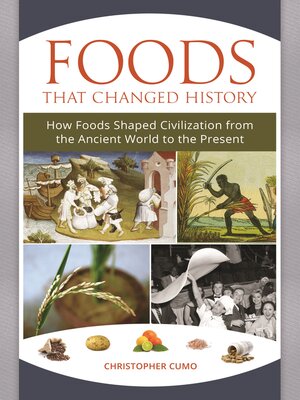Foods That Changed History
ebook ∣ How Foods Shaped Civilization from the Ancient World to the Present
By Christopher Cumo

Sign up to save your library
With an OverDrive account, you can save your favorite libraries for at-a-glance information about availability. Find out more about OverDrive accounts.
Find this title in Libby, the library reading app by OverDrive.



Search for a digital library with this title
Title found at these libraries:
| Library Name | Distance |
|---|---|
| Loading... |
Serving students and general readers alike, this encyclopedia addresses the myriad and profound ways foods have shaped the world we inhabit, from prehistory to the present.
Written with the needs of students in mind, Foods That Changed History: How Foods Shaped Civilization from the Ancient World to the Present presents nearly 100 entries on foods that have shaped history—fascinating topics that are rarely addressed in detail in traditional history texts. In learning about foods and their importance, readers will gain valuable insight into other areas such as religious movements, literature, economics, technology, and the human condition itself.
Readers will learn how the potato, for example, changed lives in drastic ways in northern Europe, particularly Ireland; and how the potato famine led to the foundation of the science of plant pathology, which now affects how scientists and governments consider the dangers of genetic uniformity. The entries document how the consumption of tea and spices fostered global exploration, and how citrus fruits led to the prevention of scurvy. This book helps students acquire fundamental information about the role of foods in shaping world history, and it promotes critical thinking about that topic.
Written with the needs of students in mind, Foods That Changed History: How Foods Shaped Civilization from the Ancient World to the Present presents nearly 100 entries on foods that have shaped history—fascinating topics that are rarely addressed in detail in traditional history texts. In learning about foods and their importance, readers will gain valuable insight into other areas such as religious movements, literature, economics, technology, and the human condition itself.
Readers will learn how the potato, for example, changed lives in drastic ways in northern Europe, particularly Ireland; and how the potato famine led to the foundation of the science of plant pathology, which now affects how scientists and governments consider the dangers of genetic uniformity. The entries document how the consumption of tea and spices fostered global exploration, and how citrus fruits led to the prevention of scurvy. This book helps students acquire fundamental information about the role of foods in shaping world history, and it promotes critical thinking about that topic.







